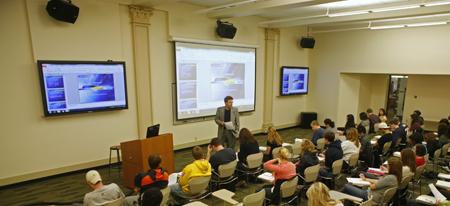“I used to be a Republican all the way, no doubt in my mind.”
Then the 2016 presidential election happened, and suddenly everything was different. For the first time, Derrick Talg found himself isolated from his own party.
“The whole thing with Trump went on, and there was a huge culture shift in the Republican party,” Talg said. “I became very disillusioned.”
For Talg, a junior in the College of Business Administration, third parties provided a welcome alternative to Democratic and Republican polarization. Although he still feels disconnected from politics, he said he feels most comfortable identifying as a Libertarian.
“I like how they take a conservative stance economically but a more Democratic stance socially,” Talg said.
Talg said that with candidates like Hillary Clinton and Donald Trump, younger voters are being misrepresented and left behind. Studies of millennial turnout from the most recent presidential election suggest voters are less inclined to identify as either a Democrat or Republican.
In 2016, young voters were more likely to identify as liberal than Democrat, and the same for the opposing political ideology is true; the amount of young adults referring to themselves as Republicans has remained stagnant, according to a 2016 Tufts University and Brookings study.
The question remains, then: Are younger voters turning to third parties to participate in politics?
“American voters generally have expressed a preference that there should be a viable third party,” Philip Rocco, assistant professor of political science, said.
A poll conducted in late 2017 by NBC corroborates this sentiment: 71 percent of millennials surveyed feel a third party is needed.
Third parties, however, do not typically fare well under a two-party system. Even citizens who desire viable third parties may not vote for one. The two-party electoral system in America has remained unchanged since the country’s inception.
“It’s not like the founding fathers said there had to be two parties, but they set up a system where both in the congressional elections and the presidential elections where whoever gets the most votes wins,” Peter Dreier, a professor of politics and urban policy at Occidental College in Los Angeles, said. “This is called ‘winner take all.'”
In other countries, particularly in Europe, governments use proportional representation, in which seats are distributed in correspondence with the total votes cast for the party. For example, if a party receives 30 percent of the votes, it wins 30 percent of the seats. This type of electoral system may encourage citizens to vote third party, Dreier said. In America, however, citizens may be dissuaded to vote third party if their votes don’t amount to any representation in office.
“Over time, voters vote strategically and realize which party is not going to be viable and they don’t vote for it,” Rocco said. “They know casting their votes for the Green Party is going to effectively deliver a vote to the Republican Party by splitting the vote for the Democrats.”
This does not mean third parties have been completely eliminated from the American system. Third-party affiliated citizens still cast votes.
“The ones that do choose to vote are saying, ‘Well, my vote might not count, but at least I’m voting for who I feel is best,’” Talg said.
Historically there have been some successful third-party campaigns, particularly among the Progressives in the early 20th century and the Socialists in Milwaukee around the same time. In contemporary politics, Sen. Bernie Sanders of Vermont and Sen. Angus King of Maine are two incumbent Independents.
The continued relevance of political parties predominantly rests on one special ability: to raise awareness of unique policy positions.
“When you look at the emergence of the Progressive Party in the 20th century, it was really instrumental in putting workers’ rights and direct democracy on the table,” Rocco said. “If there is a clear set of issues that’s just being neglected by the two major parties, that creates a real potential.”
Conor Reilly, a freshman in the College of Engineering, agreed. He leans left due to a variety of factors.
“Being part of the LGBTQ+ community, caring about the environment and science and my upbringing all influenced my political views,” Reilly said. Third parties often address those issues.
For Dreier, that continued influence might not necessarily be beneficial.
“Even if the candidate in your state isn’t who you’d like to see, there’s a phrase: ‘The perfect is the enemy of the good,'” Dreier said. He cautioned that when voting third party, citizens may be unintentionally delivering their ballot to the candidate the farthest away from their ideology.
“The people that voted for Jill Stein in 2016 … helped elect Donald Trump. I think if people learned that lesson, there might not be many people voting for third party candidates this year or two years from now,” Dreier said.
Another problem that third parties often run into is the absorption of their policies into one of the two main parties. While this may allow parties more national visibility, it creates a dilemma of autonomy.
Rocco said the main questions become, “Can we maintain our independence and commitment to our values by being an organization that works within one of the major parties? If we remain an independent unit, how can we possibly be electorally viable unless major electoral rules change?”
Shifts in the American electoral system away from winner-takes-all districts are within the realm of possibility.
“I think some states will proportion their electoral votes,” Dreier said. “Some cities will have instant runoff voting, which will allow third parties to have a voice. There are alternative ways of running elections, but our current system is so entrenched it’s hard to imagine.”
Dreier said what is more likely is greater inclusivity and accessibility; Allowing poor people, people of color and formerly incarcerated people to vote will increase representation.
Ultimately, Dreier suggested, voting for one of the two main parties remains the safest bet for a voter’s voice to be heard.
“If you wait for utopia, you’ll be waiting a long time,” Dreier said.




